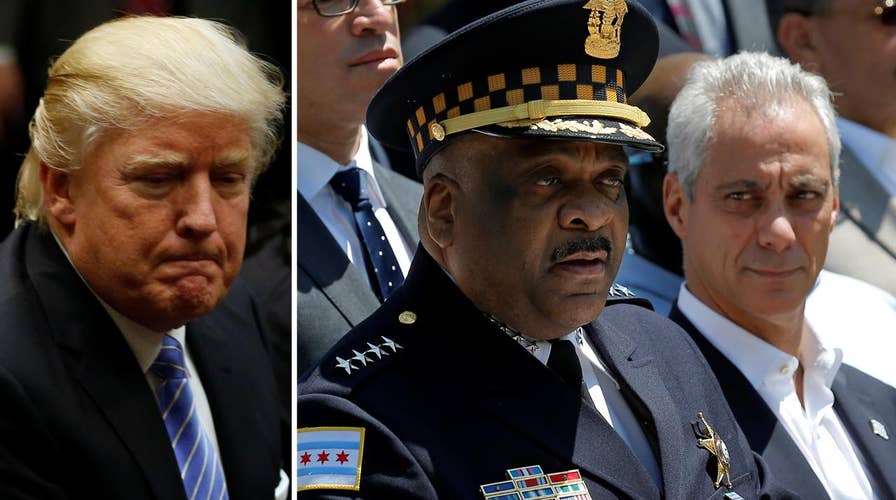Can the president send 'the feds' to end Chicago violence?
Fox News anchor and attorney Gregg Jarrett breaks down Trump's options
President Trump tweeted Tuesday night that he will “send in the Feds” if Chicago doesn’t take care of its gun violence problem – but what could this involve?
Trump tweeted that "if Chicago doesn't fix the horrible 'carnage' going on" then he would act, but it was not immediately clear what, if anything, he had in mind.
The ability of the federal government to wade into state affairs is deliberately limited as the founders intended, but there are options available to the president.
“Send in the feds” may bring to mind sending troops into Chicago. However, the Posse Comitatus Act of 1878 prohibits the federal government from deploying troops to deal with a local matter. The Act was passed to end the use of federal troops to police state-level elections in former Confederate states. However, there are exceptions. President Eisenhower in 1957 sent in the 101st Airborne into Little Rock, Arkansas to quell the civil rights unrest there.
In 2006 Congress revised the law in the wake of Hurricane Katrina, so the president can send troops in order to restore order whenever local and state authorities cannot, which gives Trump more wiggle room. Trump could also federalize the state National Guard and deploy it – Presidents Eisenhower, Kennedy and Johnson all did this. However, this would most likely be a last resort option.
Sending the National Guard into Chicago may seem extreme but it isn’t entirely out of the realm of possibility. Illinois Gov. Bruce Rauner, a Republican, was asked about such an outcome in August, as the governor of a state can also mobilize the National Guard. However, he nixed the idea and said that while he had discussed the idea with police and the National Guard, he concluded it was not a good idea.
The Chicago Tribune pointed to the possibility of the U.S. attorney coordinating with branches of the federal government. The current attorney for Illinois' Northern District is Zachary Fardon and he has placed solving violent crime at the top of the city’s agenda – although he warned that the city couldn’t arrest its way out of the problem.
Fardon noted that his office and federal agencies including the FBI, DEA and Bureau of Alcohol, Tobacco, Firearms and Explosives "have ramped up their resources to help tamp down this spike in violence." The Tribune reports that Fardon also announced that federal agencies had launched new crime-fighting programs with city and state officials, though he didn't provide details.
Trump could encourage those agencies to up their game in violence-torn cities. He could, for instance, send FBI agents to be embedded with local law enforcement.
The Tribune also noted that federal prosecutors have used racketeering and gun laws to go after gangs – which are particularly prevalent in the Windy City. Putting higher priority on convicting and imprisoning gang leaders could do a lot to end the violence, although the Tribune noted that breaking up a gang’s command structure can lead to more rivalries and more violence.
Another option for Trump would be to pressure Chiacago to reinstitute policies such as stop-and-frisk by withholding federal funds until they change.





















